Weaving Life
Indigenous women’s organizations of Quetzaltenango and Totonicapán, Guatemala gathered to share knowledge, experiences, and strategies, and dialogue with stakeholders.
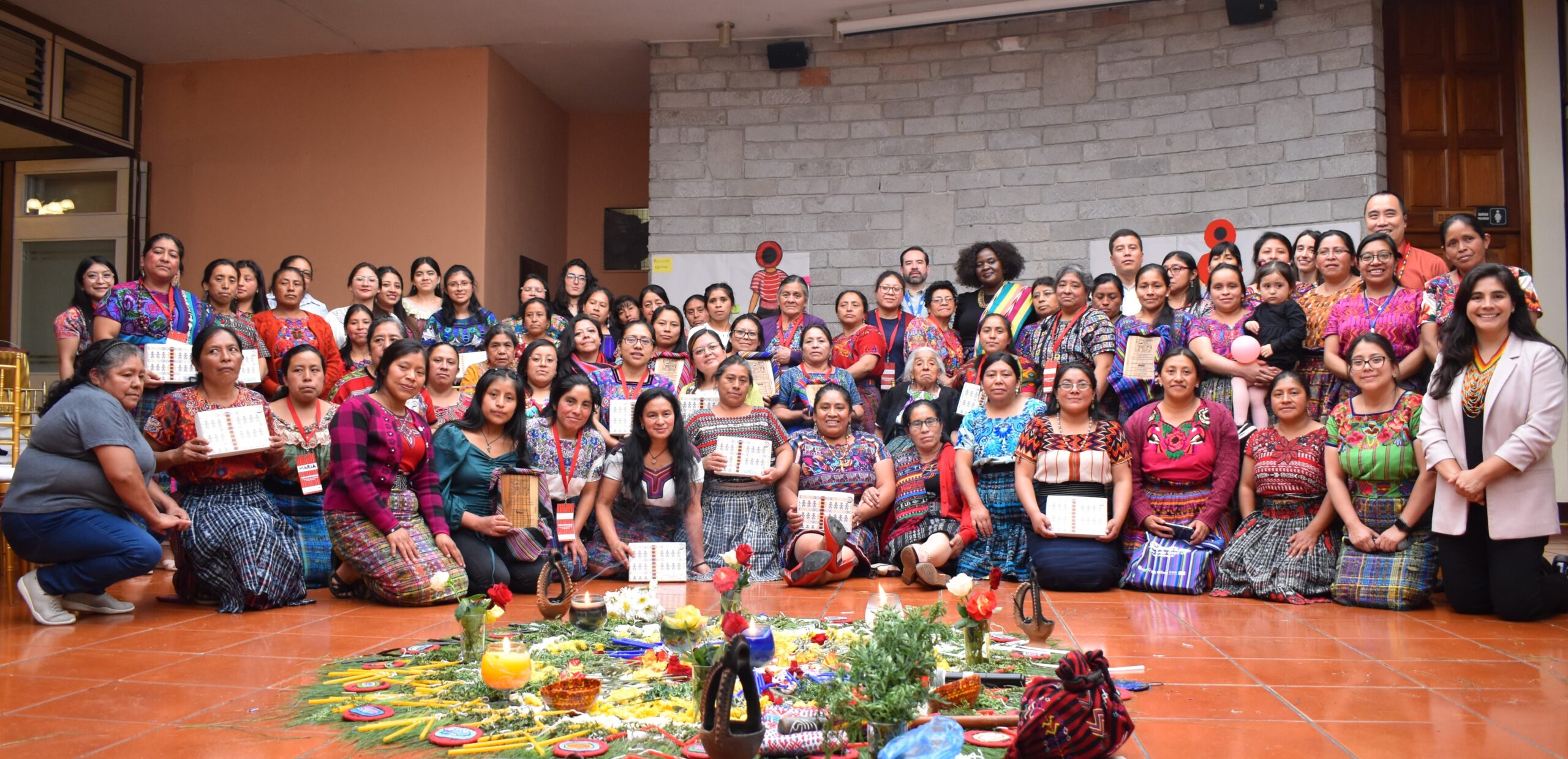
Quetzaltenango, Guatemala – The FSC Indigenous Foundation, in collaboration with Hivos and the Mesoamerican Alliance of Peoples and Forests (AMPB), through the Coordinating Committee of Women Territorial Leaders of Mesoamerica (CMLT), organized a National Meeting of Indigenous Women’s Organizations of Quetzaltenango and Totonicapán, Guatemala. This significant event, part of the Indigenous Women’s Economic Empowerment (I-WEE) Initiative, took place on August 8 and 9, to strengthen the empowerment and advocacy of Indigenous women.
The event brought together more than 100 delegates from over 30 Indigenous women’s organizations participating in the I-WEE initiative and key stakeholders from international cooperation and private and public sectors. It served as a platform to explore new solutions and strategies for Indigenous women to be at the center of economic and political actions.
Participants shared knowledge, experiences, and strategies on three crucial topics:
- Indigenous women’s political participation and advocacy
- Addressing violence against Indigenous women
- Economic empowerment of Indigenous women
The Mayan cosmovision was the foundation of the event, opening each day with an offering of gratitude and closing with a spiritual moment. Participants sat in a circle around an altar in the center with offerings of candles symbolizing the four cardinal points, as well as the Heart of Heaven, the Heart of the Earth, and flowers. The slogan for the event was “Weaving Life.”
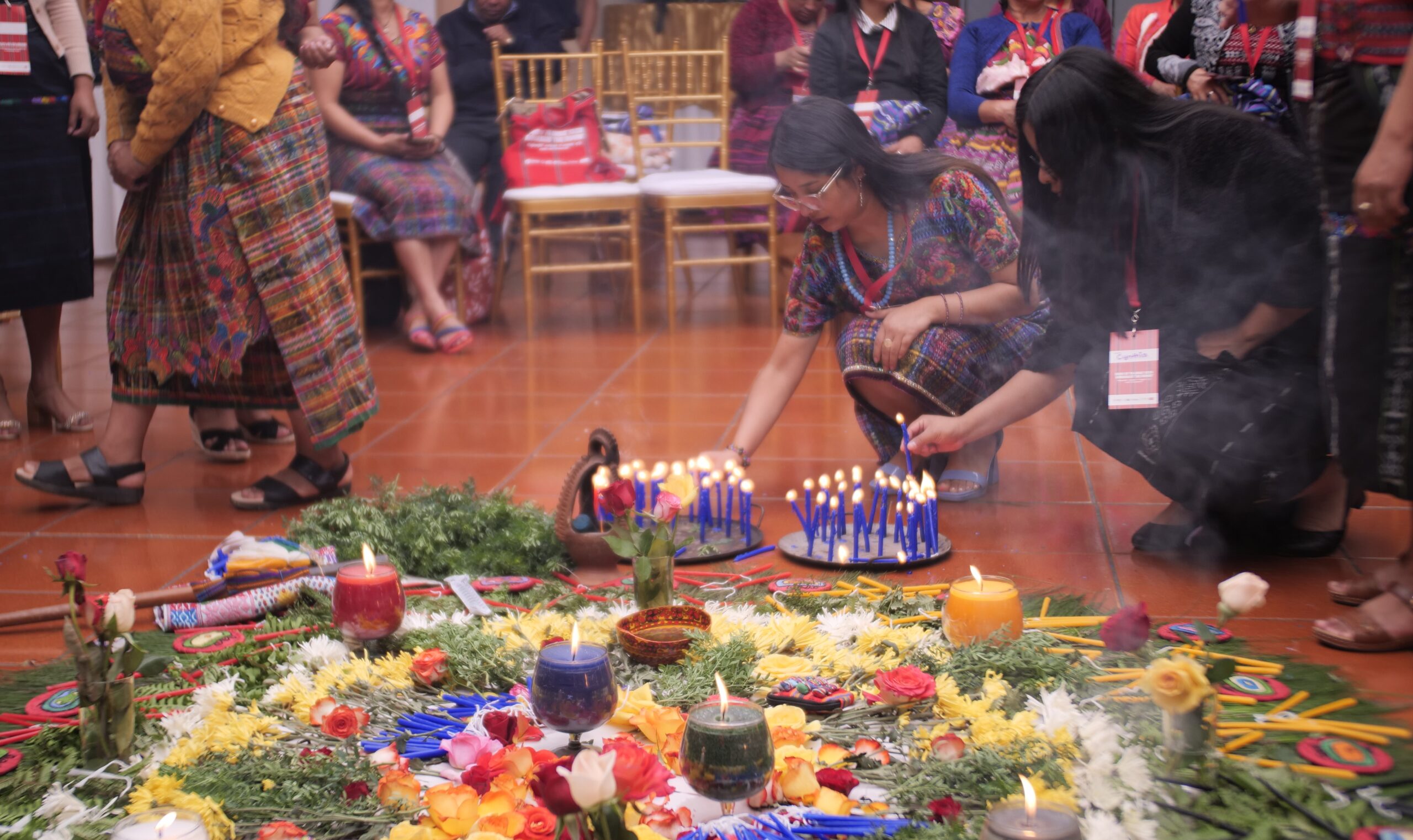
Day 1: Empowerment and recognition among Indigenous women
During the first day, delegates of Indigenous women’s organizations connected, shared wisdom, and discussed their experiences on the three key topics.
In the first word circle, “Indigenous women and their participation in politics, in decision-making spaces and the challenges and opportunities encountered,” Indigenous women emphasized the importance of being recognized as active subjects in politics and decision-making. They shared challenges such as violence, machismo, competition between women, and discrimination, for example for wearing their traditional clothing. They proposed solutions for increasing the visibility of Indigenous women, starting in the family, all the way to participation in politics. Media and communications can be a tool for change. Another solution proposed was the need for workshops for men to understand how to treat and work with women. One conclusion was clear – the need for regulations promoting parity and alternation, not just in the political sphere.
Those who did not have the opportunity to speak added their ideas with post-it notes to the wall, and this information was collected and incorporated into the dialogues the following day with stakeholders.
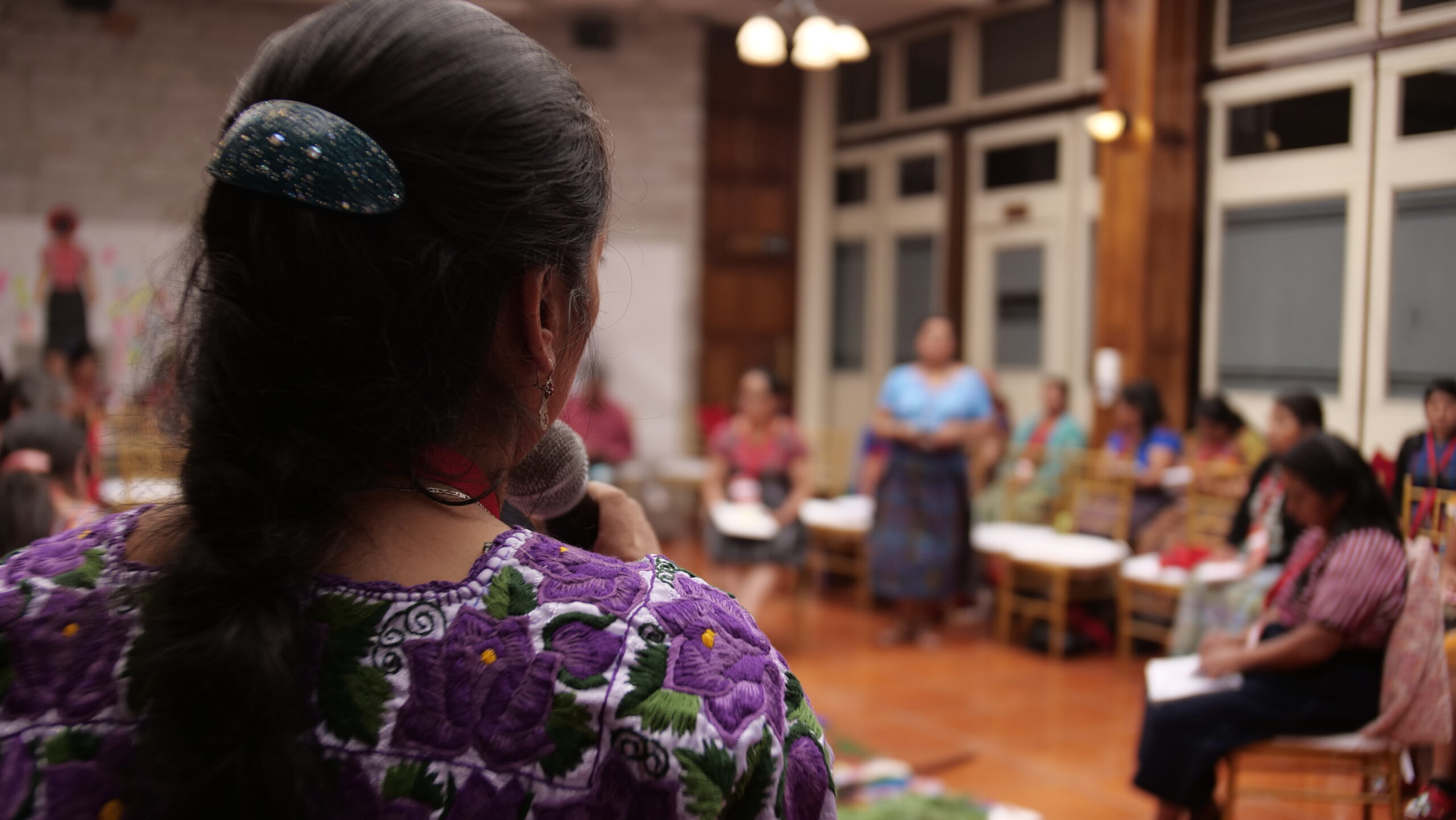
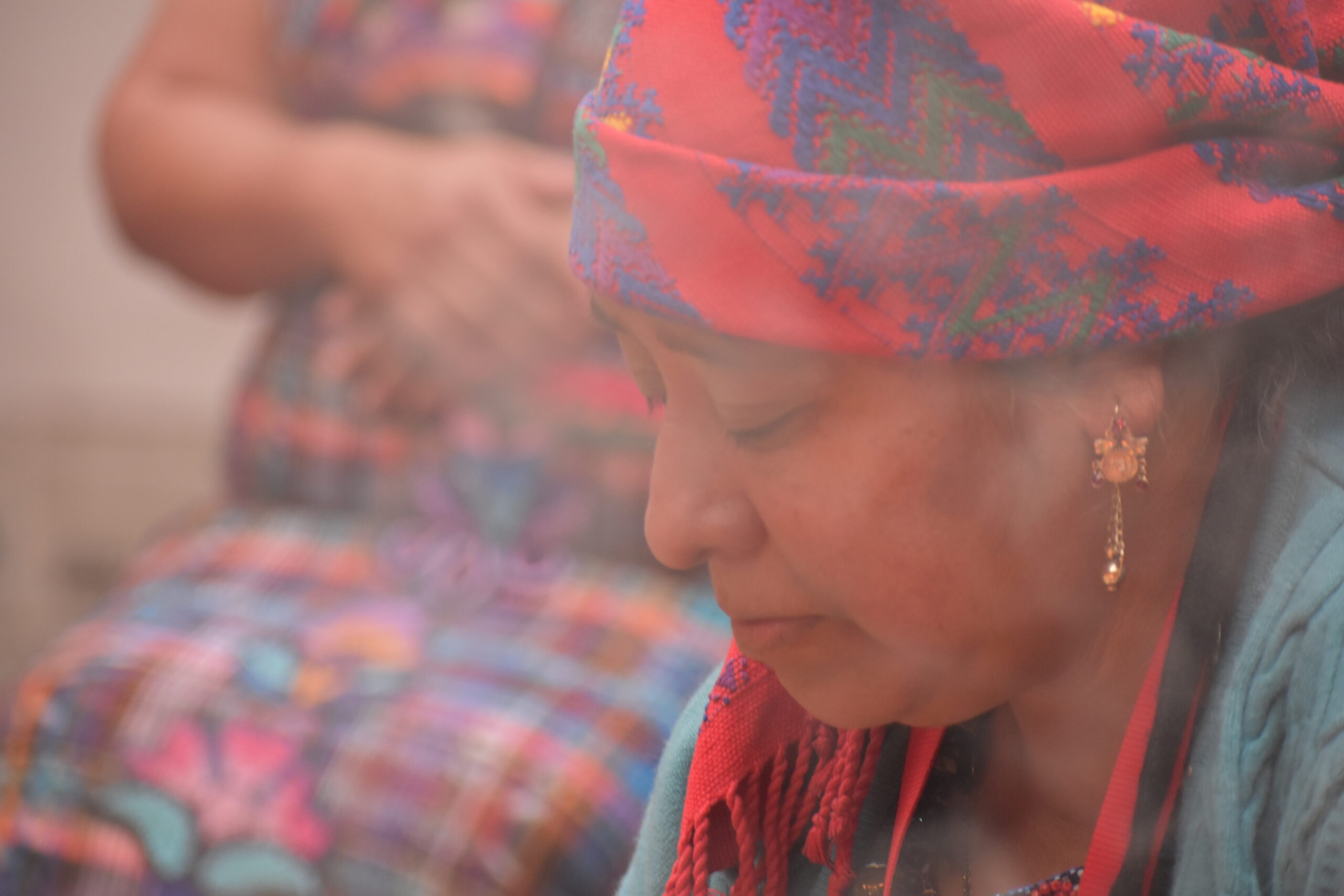
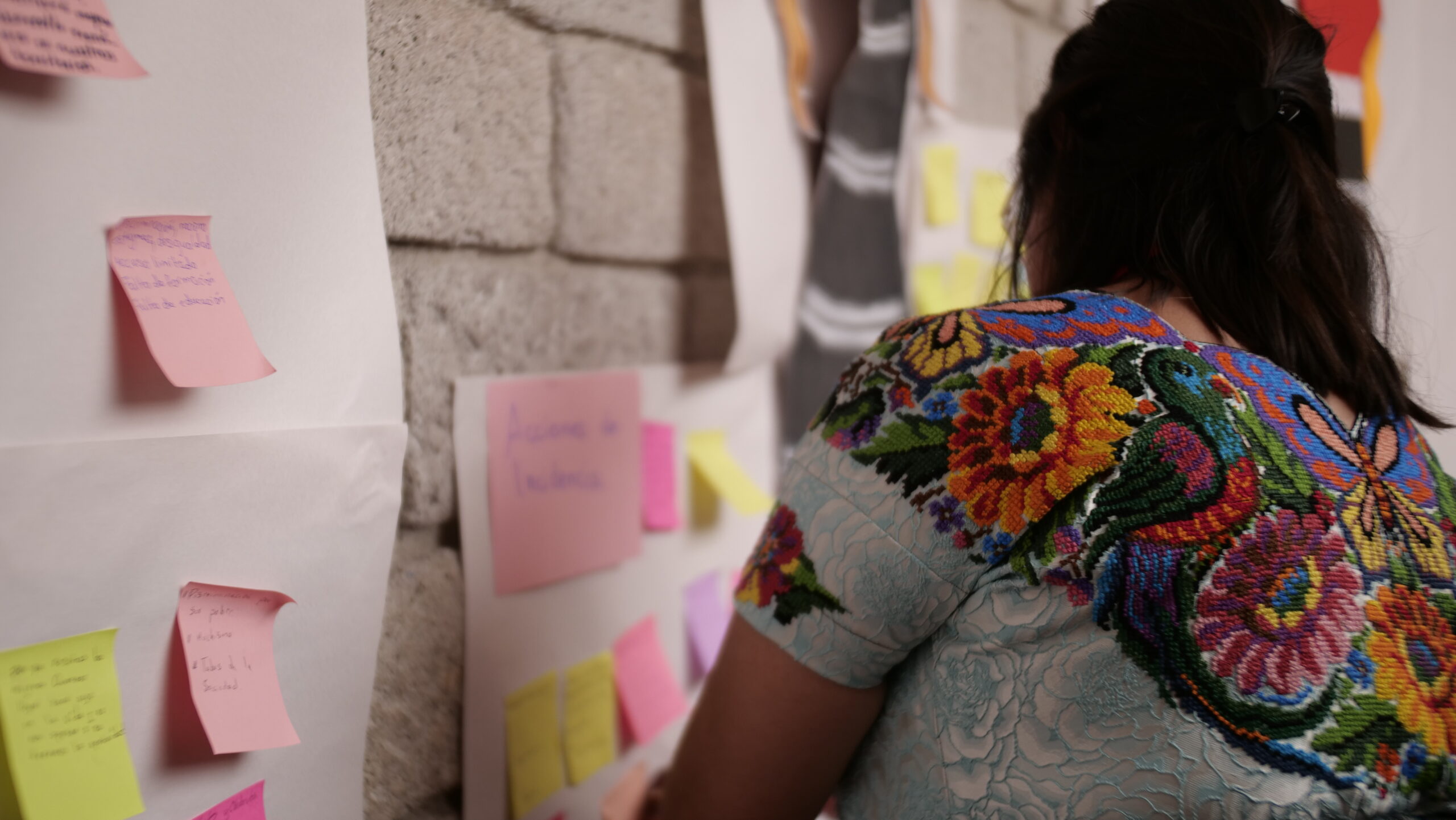
The next word circle, “Advocacy actions that can be implemented by communities to reduce violence against Indigenous women,” featured two life stories of Indigenous women survivors of violence who have managed to leave abusive relationships. They have taken on leadership roles in their communities, helping others to overcome violence.
Solutions were proposed at all levels, including the need for justice; training for women on rights and for the staff of institutions that guarantee women’s rights on how to provide dignified, respectful, accessible, and culturally relevant care; and the importance of self-love.
“I feel fortunate to be a Mayan woman,” said one participant.
Participants also discussed the importance of healing processes and ceremonies, and Nan Graciela Velasquez Chuc led a healing process with plants.
The final word circle of the day, “What is being done for the economic development and entrepreneurship of Indigenous women” included interventions from women involved in various economic projects, from textiles to chocolate and tomatoes. In the absence of political participation due to racism, economic development was noted as a key channel for Indigenous women’s empowerment.
Women shared their stories to create businesses, highlighting key challenges such as water scarcity, harvest loss, sanitary licenses, organizational strengthening, production equipment, and the need for increased technical knowledge. Indigenous women’s organizations have been overcoming these challenges through knowledge exchanges, healing from the Mayan cosmovision, and articulating exactly what they wanted to achieve. One participant noted that this is the definition of empowerment – knowing what you want and seeing the path to achieve it.
As a closing of this word circle, Patricia Chuc led a self-care and wellness activity that incorporated breathing, motion, and water.
The day concluded with a cultural evening with a performance by the Maya Kaqchikel group Sotz’il Jay and a reading by Mayan poet Negma Coy. It invited a reflection on how art can be healing and a uniting force.
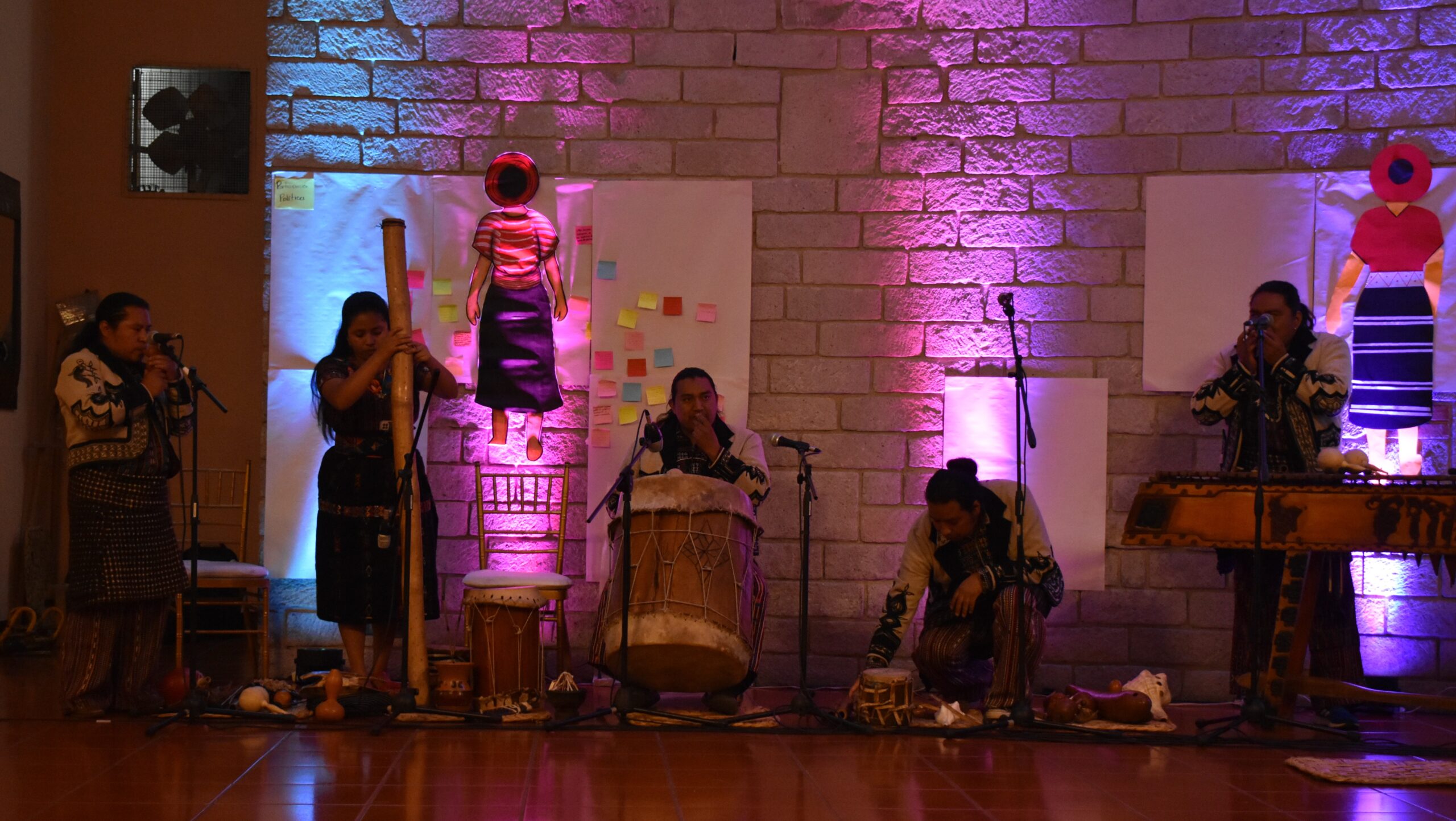
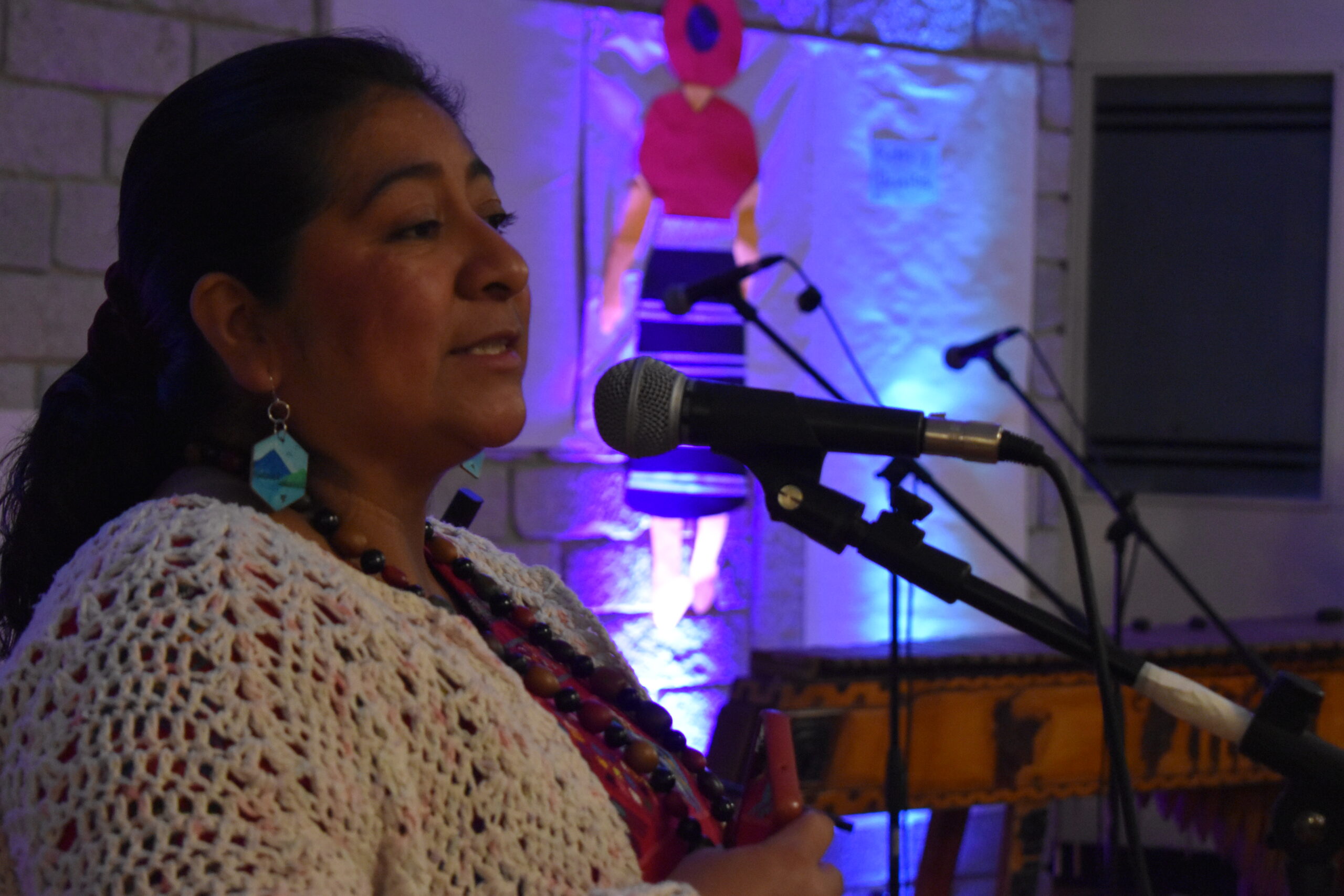
Day 2: Collaborative dialogues with key actors
On the second day, key actors from communities, Indigenous Peoples’ authorities, local and national governments, UN agencies, implementing partners, multilateral organizations, businesses, and civil society joined the event for inclusive dialogues. The contributions and insights from Indigenous women gathered the previous day were organized into prioritized topics. These were then shared during the dialogues to ensure the creation of impactful actions and strategies that consider the identity and culture of Indigenous women.
The first dialogue “Actions to promote the political participation of Indigenous women” highlighted the importance of Indigenous women’s own mobilization and advocacy. Participants also noted the need for transparent information on resources directed to them, and for projects and programs that respond to Indigenous women’s realities, priorities, and leadership.
Indigenous women’s power and valuable contributions were highlighted, especially in the promotion of peace. Women have different ways of seeing and making decisions, and this complementarity is needed at all levels. One Indigenous woman participant noted the “wealth of the struggles we have in common.”
At the end of this dialogue, the Indigenous women participants read the demands they had formulated the day before, which included: reform of the Electoral and Political Parties Law, promoting that each political party has at least 50% participation of Indigenous women; creation and promotion of opportunities for women by the State to participate in socio-political environments under equal conditions; strengthening and financing of institutions created to protect and promote the rights of Indigenous women.
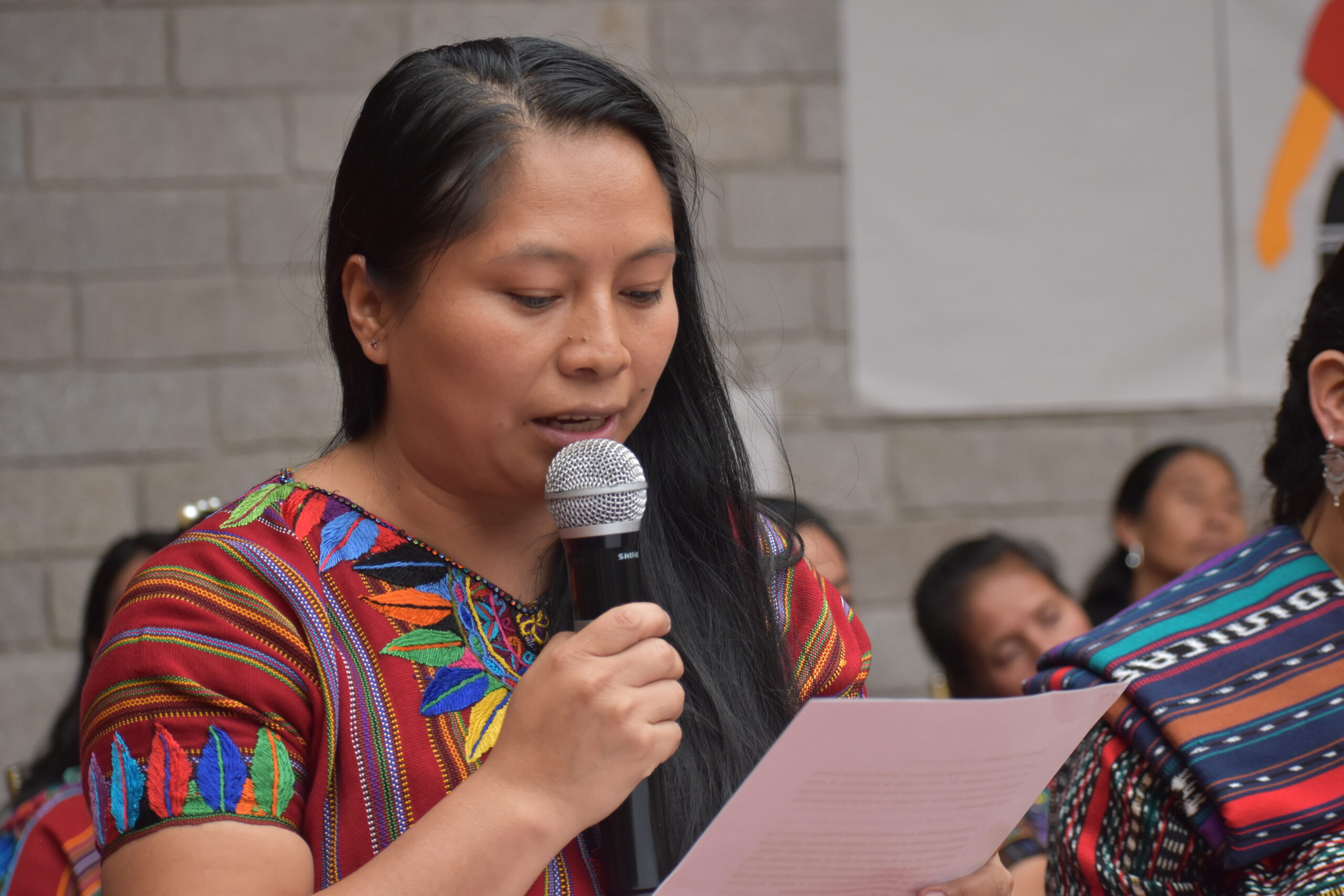
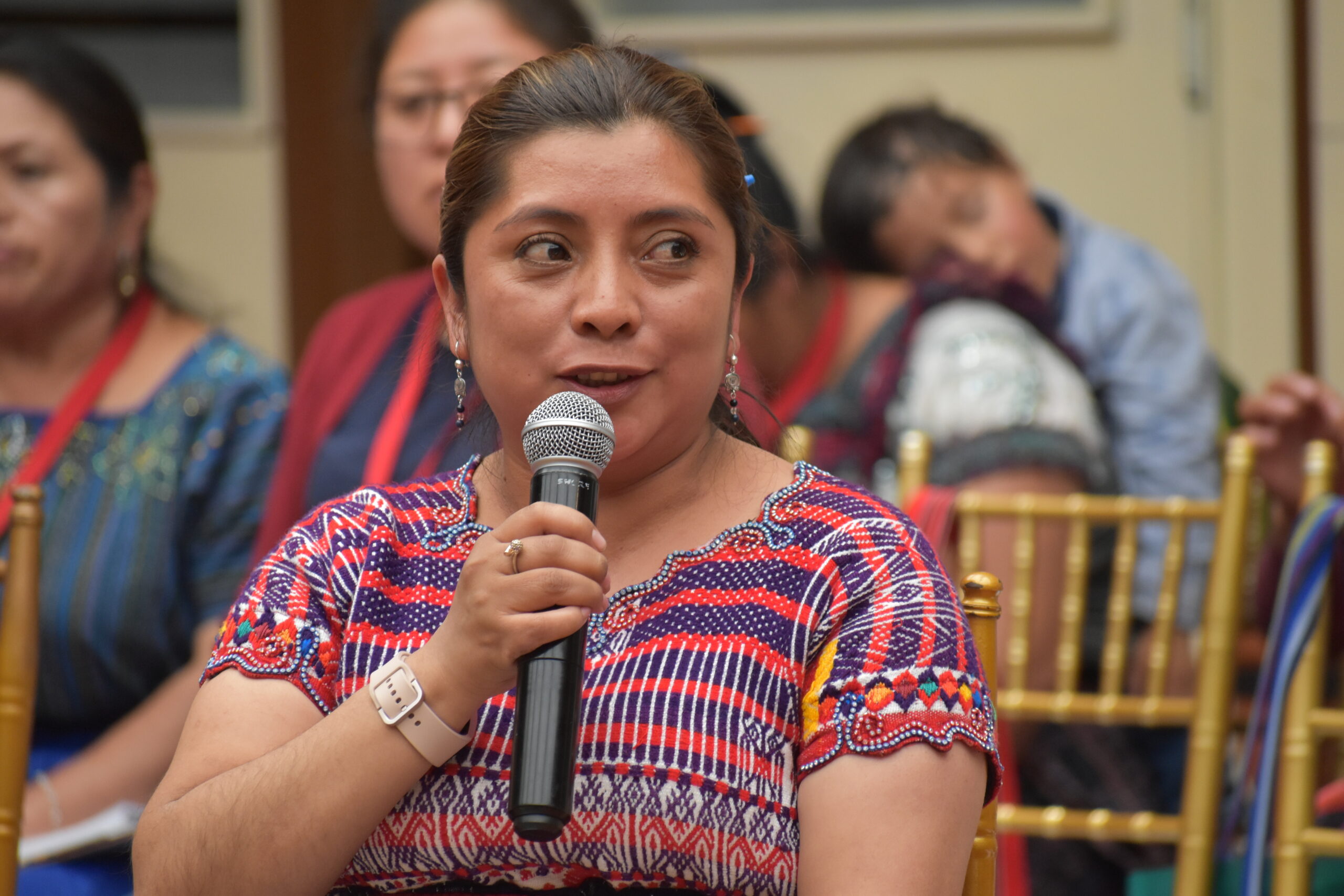
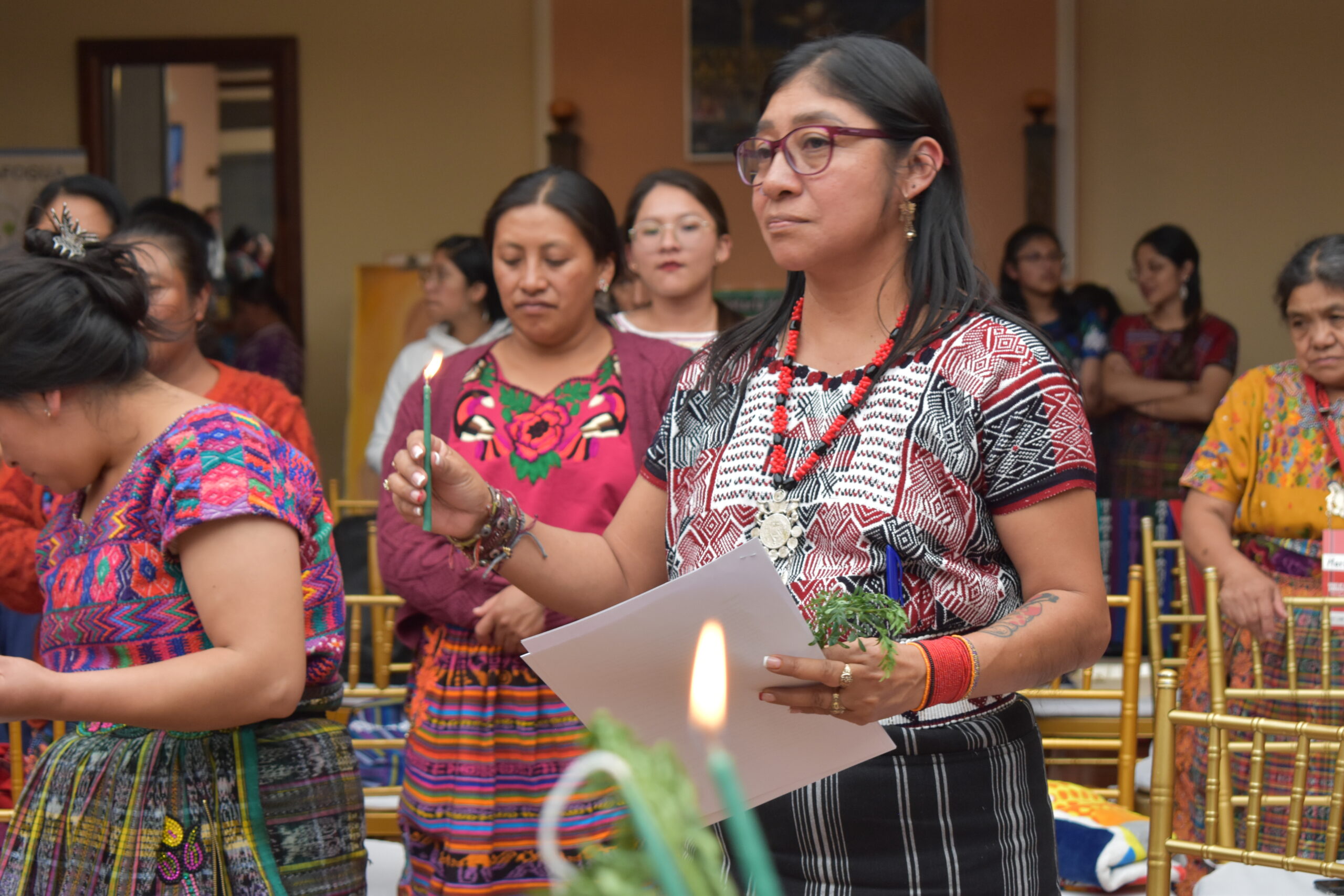
The second dialogue “Actions to prevent and reduce violence against Indigenous women” highlighted the importance of education of women and youth on their rights.
The women’s demands included: a judicial system that responds effectively to complaints of violence with cultural relevance; better medical and psychological health care for survivors of violence, as well as training for health personnel; mass visual and radio awareness campaigns aimed at the entire population to promote a culture of peace and prevention of violence; culturally relevant care for women in Mother languages with respect for their culture, beliefs, and way of life; laws, policies, plans and programs in favor of women respond to their needs and emerge from the grassroots level.
The final dialogue of the day “I support economic development and Indigenous women’s entrepreneurship” highlighted the need for concrete and transparent funding, beyond words of commitment.
The women read their demands in this area, mentioning: facilitating market access for Indigenous women’s products; providing women with seed capital to strengthen their enterprises; providing Indigenous women with new technologies and capacity building for their use, together with their Indigenous knowledge; promoting spaces for the exchange of experiences at the local, national, regional and international levels with Indigenous women entrepreneurs; and that implementing partners do not duplicate efforts, but rather develop integral processes according to their specialties to support enterprises.
To close the two-day event, participants received recognition awards created in wood with the name of the event in ancient Mayan epigraphic writing, before an energetic closing before the alter to end the two-day meeting.
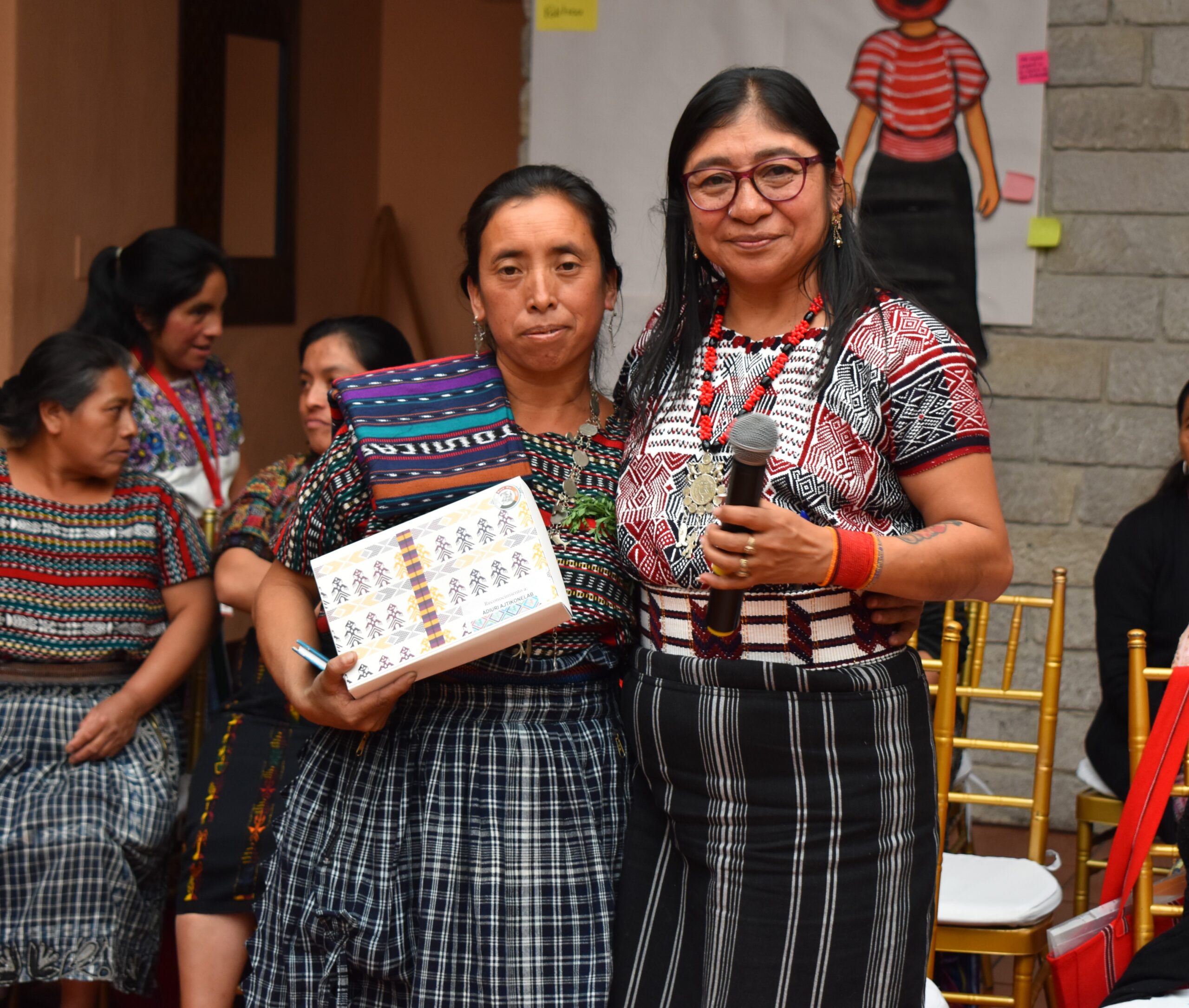
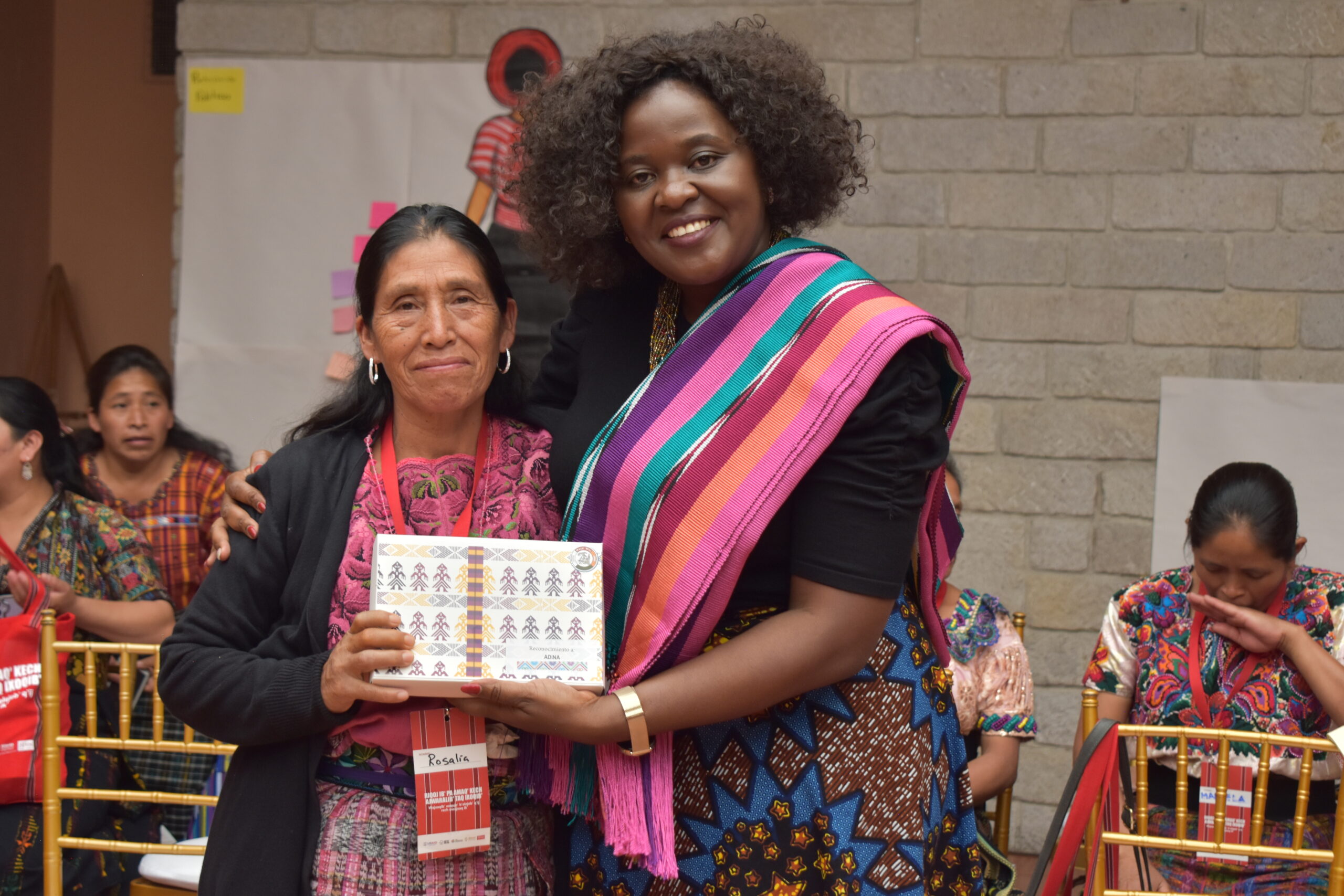
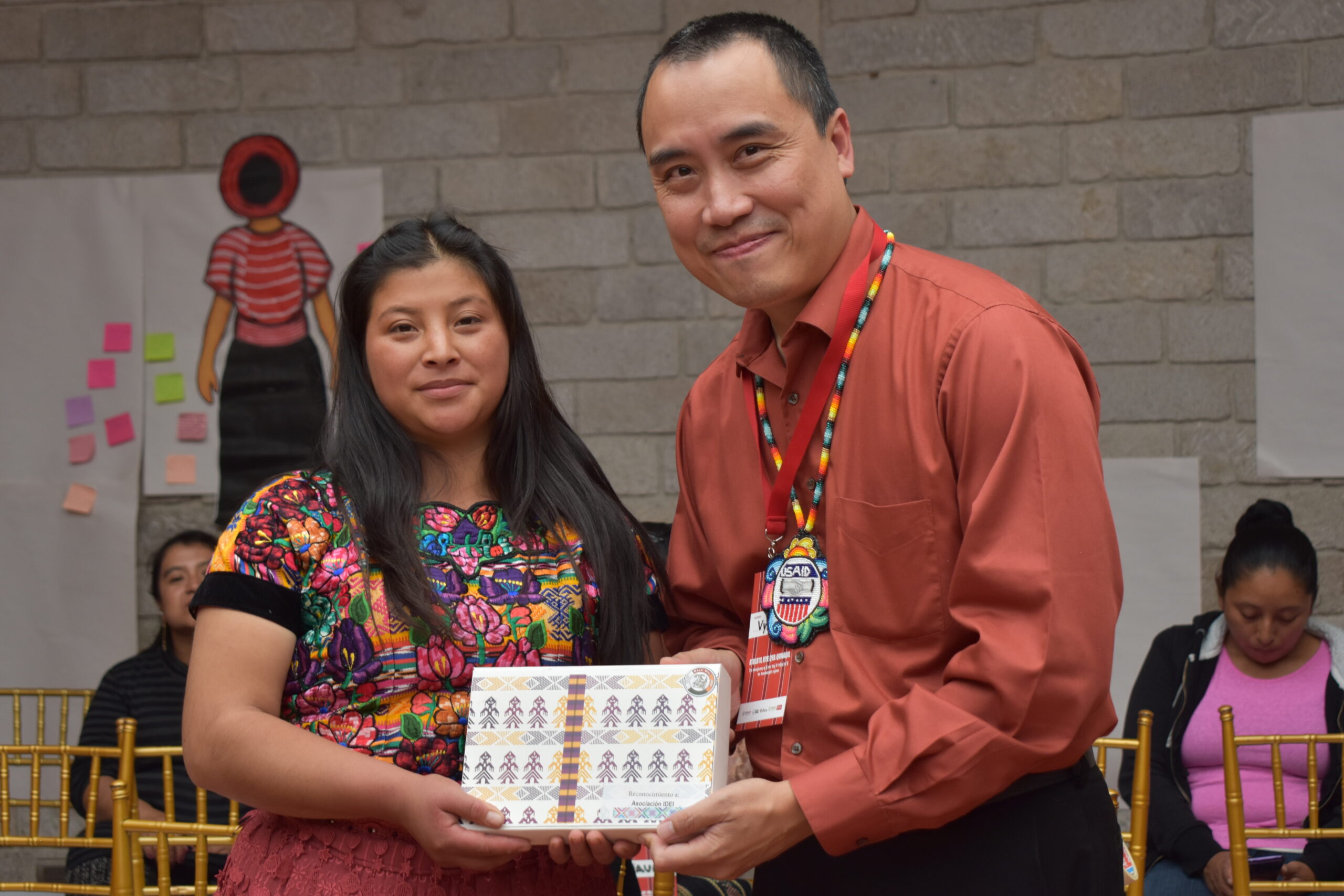
Pioneering elements of this initiative
The FSC Indigenous Foundation introduced several pioneering elements at the event, emphasizing an Indigenous women’s cosmovision perspective.
One of the key innovations was providing simultaneous interpretation in the Mayan languages K’iche’ and Mam, in addition to Spanish and English, to facilitate participation in the women’s mother languages. The FSC-IF, in collaboration with Angloservicios, provided training for the K’iche’ and Mam interpreters on using Zoom’s virtual interpretation booths. This likely marks the first time simultaneous interpretation of Indigenous languages has been included in a national event in Guatemala.
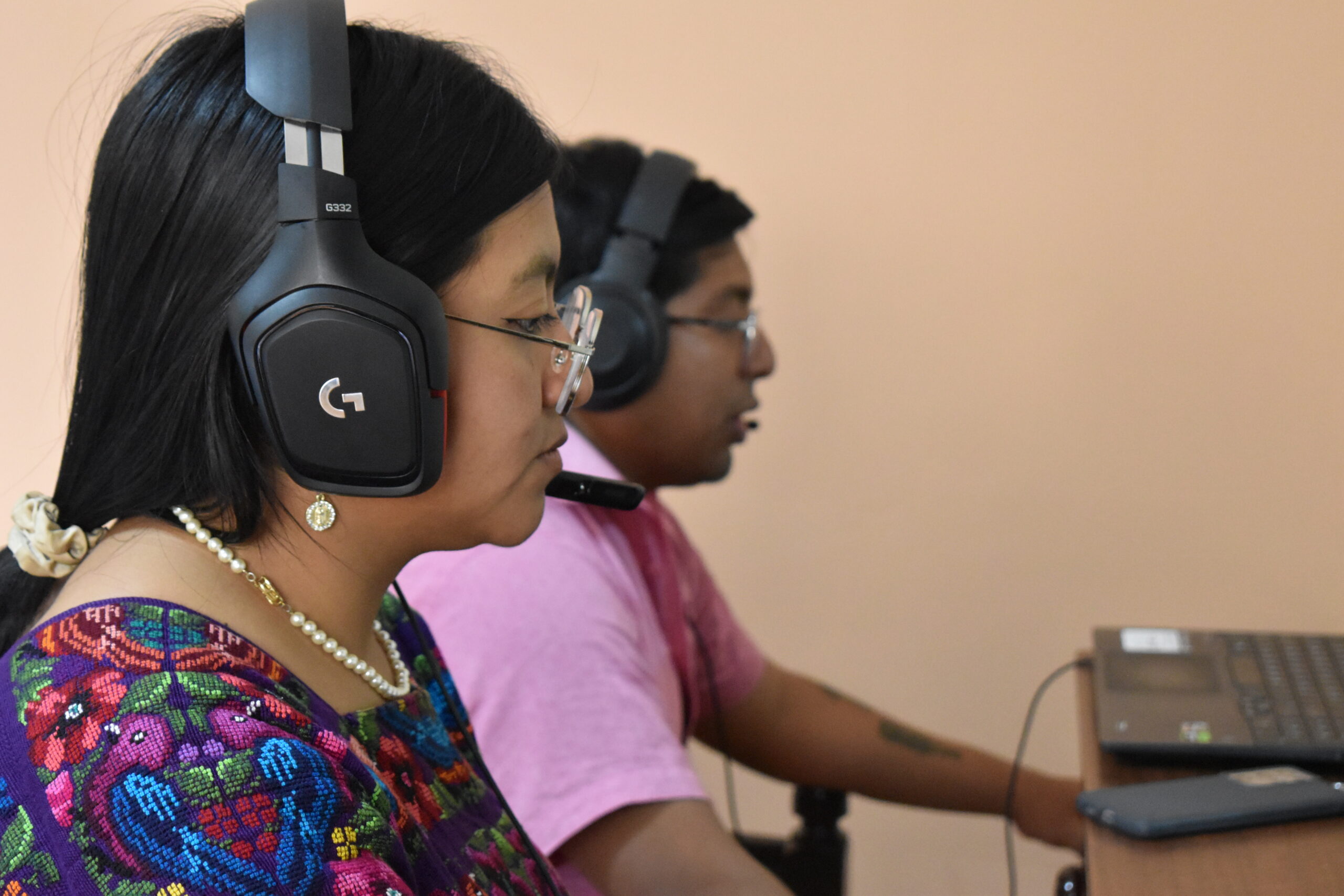
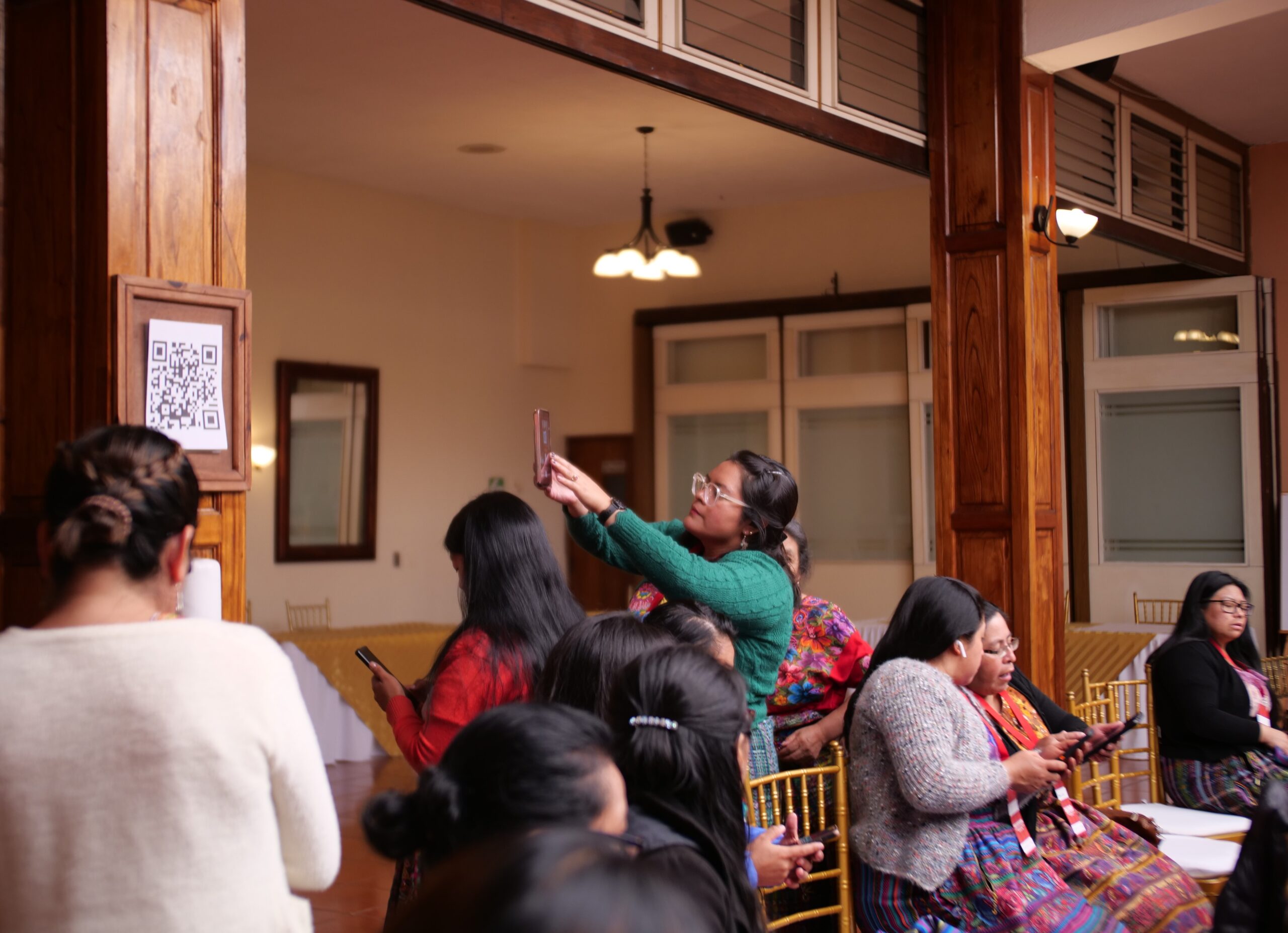
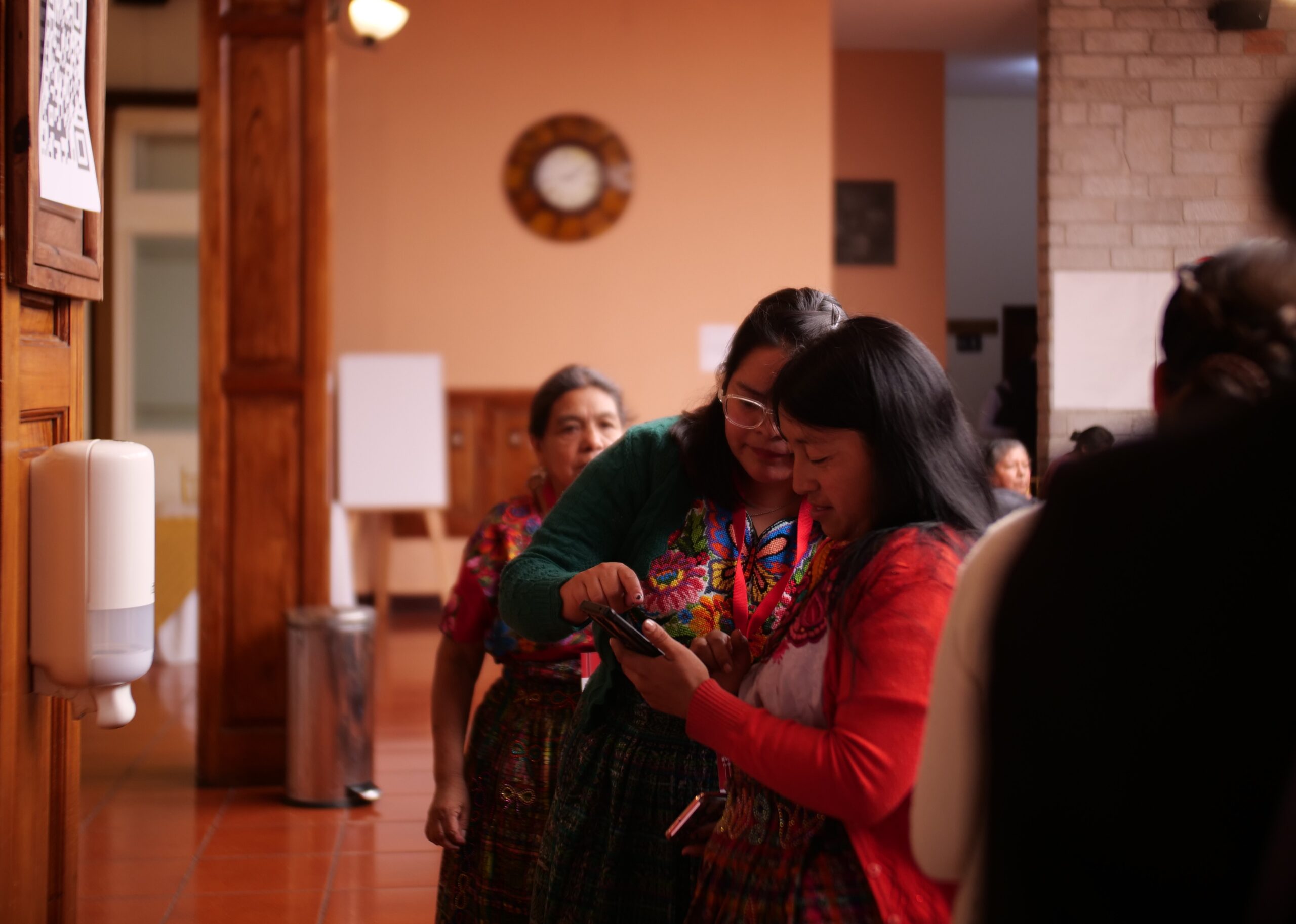
Another crucial element was childcare provision, recognizing that many women cannot attend activities and workshops due to childcare responsibilities. The FSC-IF has incorporated childcare in all I-WEE workshops so mothers participate fully while their children engage and learn together. Facilitators used a ludo-pedagogical methodology, incorporating elements of the Mayan cosmovision for the children.
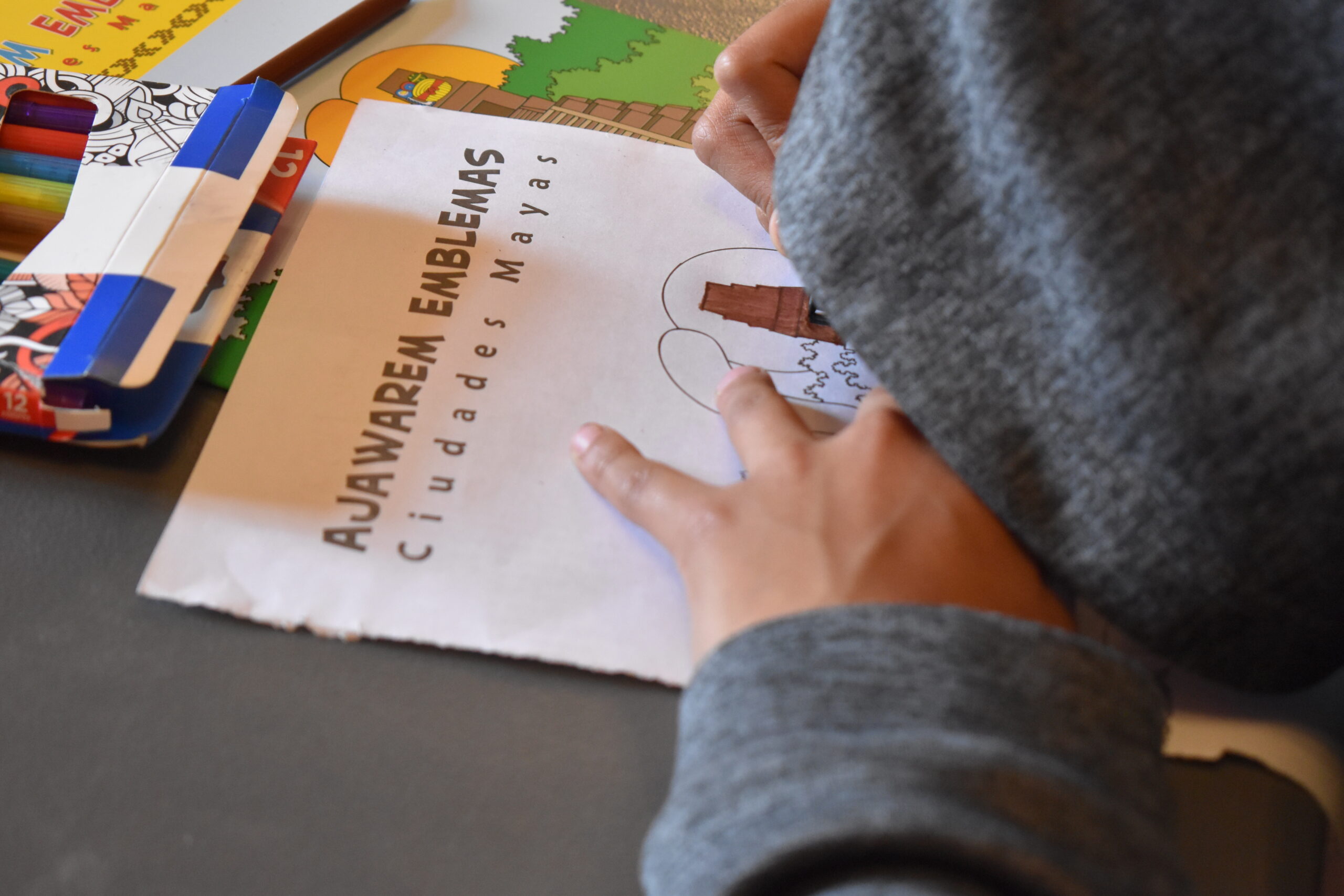
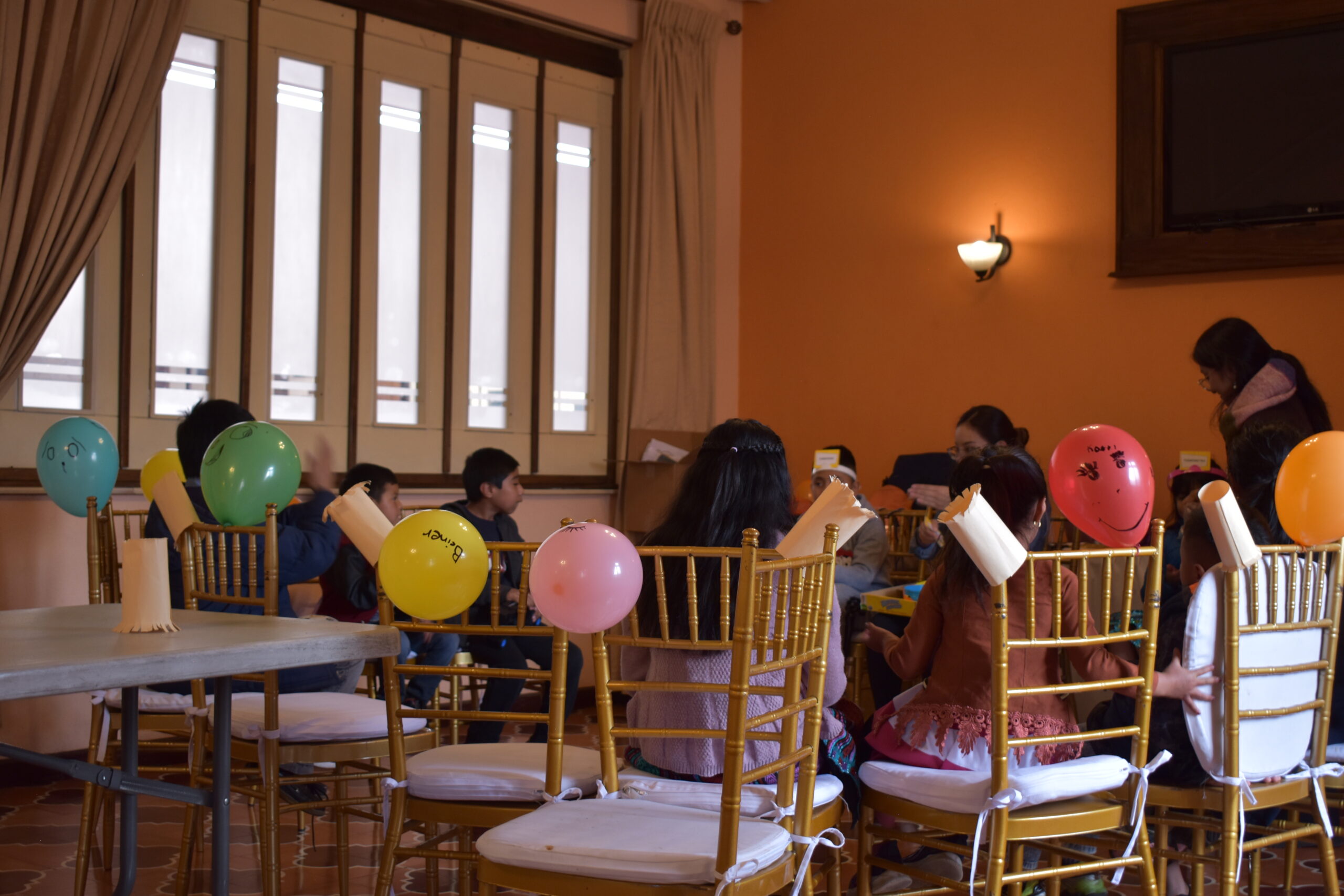
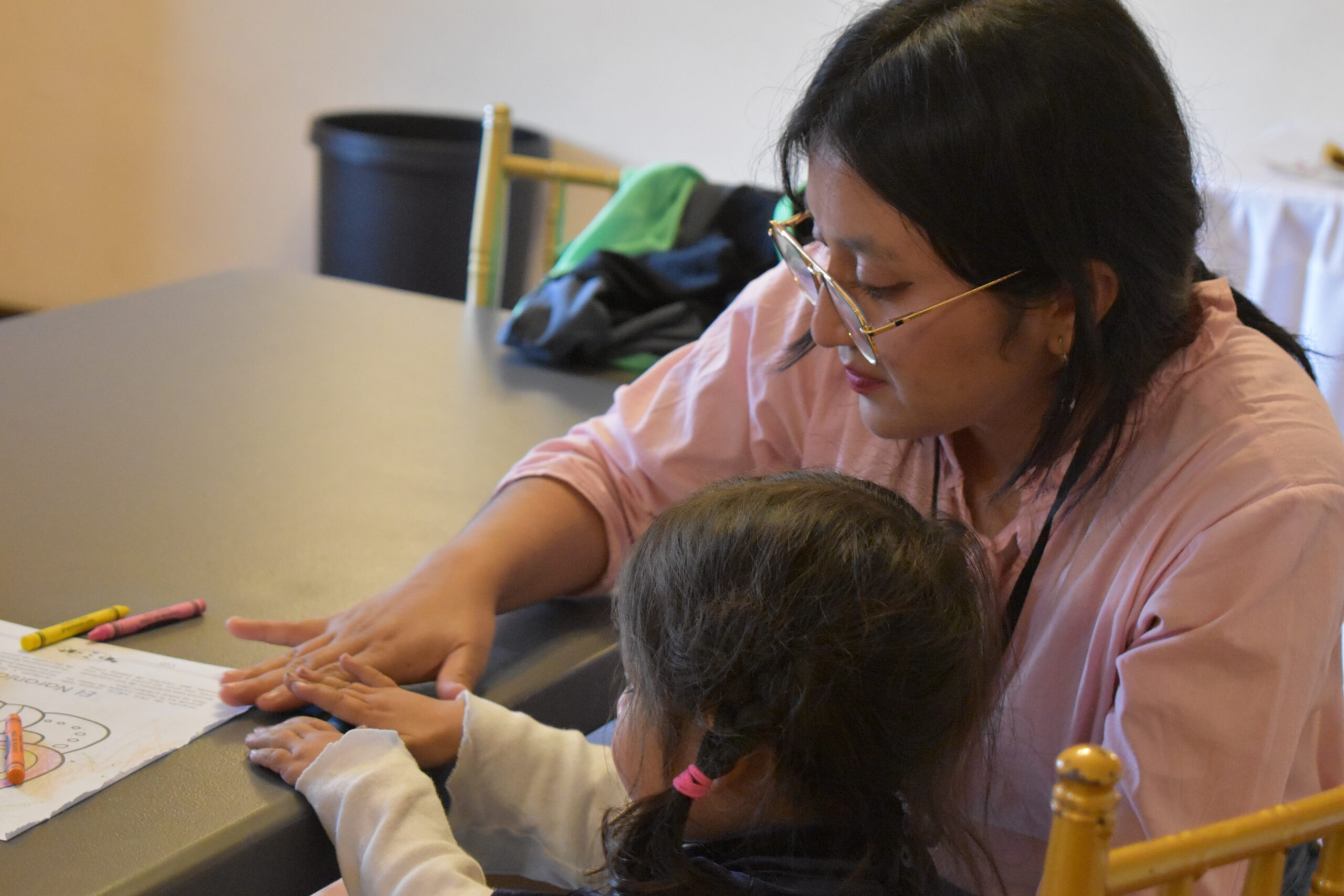
The way forward
This event underscores the commitment of the FSC Indigenous Foundation and its partners to support Indigenous women’s organizations in Guatemala to lead their development. The Meeting initiated concrete actions to promote Indigenous women’s economic, political, and social empowerment.
FSC-IF will consolidate the results of the dialogues of the meeting together with the demands articulated by Indigenous women. We will return this information to the Indigenous women’s organizations to accompany them, together with partners and allies, in positioning in different spaces and mechanisms of decision-making, resource mobilization, and design and implementation of programs and projects.
We are continuously seeking technical and financial partners to expand our work with I-WEE and other crucial initiatives. If your organization or business is interested in collaborating with us and with Indigenous women for sustainable change, we invite you to connect at fsc.if@fsc.org.
About I-WEE
The I-WEE initiative works with Indigenous women and girls in Guatemala and Honduras to promote their economic empowerment by strengthening capacities, generating enabling environments for their active participation and advocacy, and strengthening productive initiatives led by Indigenous women. It is implemented by FSC-IF in collaboration with partners AMBP, Hivos, UNDP, FAO, and UN Women / Indigenous Women’s Platform and funded by the United States Agency for International Development (USAID) and the Forest Stewardship Council (FSC) with private sector partners.
About FSC Indigenous Foundation
The FSC Indigenous Foundation is a global Indigenous organization promoting Indigenous-led actions for their development and self-reliance. We work to elevate Indigenous Peoples in their contribution to the protection of Mother Earth and recognize them as providers of solutions and partners to fight against global challenges.
About AMPB
The Mesoamerican Alliance of Peoples and Forests (AMPB) is a network of Indigenous Peoples and local communities that protect the largest forested areas from Panama to Mexico, seeking solutions for a balanced coexistence with nature safeguarding ancestral knowledge and combining it with innovative ideas. The AMPB promotes capacity building for Indigenous women through the Coordinating Unit of Territorial Women Leaders of Mesoamerica (CMLT).
About Hivos
The Humanist Institute for the Cooperation with Developing Countries (Hivos) is an international organization working for a world in which people can realize their full potential and unleash their ingenuity and creativity to build just and sustainable societies for themselves and future generations. Hivos’ mission is to amplify and connect voices that promote social and environmental justice and challenge power imbalances.
